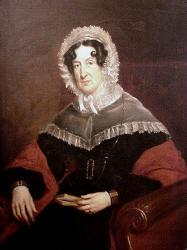? - 1772 Person Name: R. Courteville Composer of "ST. JAMES" in The Church Hymnal Courteville, Raphael or Ralph (d. 1772), organist and political writer, was the son or grandson of one of the gentlemen of the Chapel Royal who bore the same name, and who died on 28 Dec. 1675. The organ from the Chapel Royal was presented by Queen Mary in 1691 to the church of St. James's, Westminster, and on 7 Sept. in the same year a Ralph Courtaville, who had been strongly recommended by the Earl of Burlington, and who had previously been a chorister in the Chapel Royal, was appointed the first organist, with a salary of 20l. per annum for himself and 4l. for a blower.
This Courteville, Courtaville, or Courtivill, was no doubt the composer of six ‘Sonatas composed and purposley (sic) contriv'd for two flutes,’ published by Walsh about 1690; of a song introduced in Wright's ‘Female Virtuosoes,’ and supposed to have been written by Ann, countess of Winchilsea; of a very graceful song, ‘To Convent Streams,’ in ‘Duke and no Duke,’ and of songs in ‘Oroonoko.’ He was one of the composers who furnished the music for part iii. of D'Urfey's ‘Don Quixote’ in 1695. The well-known hymn tune, ‘St. James's,’ is also by him. It has been supposed that this Courteville died about 1735, and was succeeded by his son of the same name; but as the vestry minutes of the parish, in which all appointments, &c. are carefully recorded, contain no mention of such a change of organists, while no record of the father's death can be found, we are compelled to believe that the existence of the son is a mere assumption, made in order to account for the long tenure of the post by a person or persons of the name of Courteville.
This conclusion is strengthened by various entries in the vestry minutes; in January 1752–3, and again in June 1754, letters are written to him warning him that unless he attends personally to the duties of the post he will be dismissed. Whether he endeavoured to perform the duties himself after this we do not know, but he was certainly not dismissed, and shortly afterwards an assistant, ‘Mr. Richardson,’ was appointed. On 12 June 1771 it was reported to the vestry that Courteville gave this assistant only one quarter of his salary for doing the whole work, and he was thereupon ordered to share the payment equally with Richardson. Seven years before this, in 1764, the assistant, with two others, was consulted as to the state of the organ and the undertaking of repairs to its structure. Neither at this time, nor when the improved instrument, repaired by Byfield, was tried, was Courteville's advice asked in the matter, from which we may conclude that he was long past all work, although he was allowed to keep the post.
This Raphael Courteville, whether or not he be identical with the first organist of the church, took a somewhat active part in politics towards the end of Sir Robert Walpole's administration. He is stated to have married, on 14 Sept. 1735, a lady named Miss Lucy Green, with a fortune of 25,000l. In 1738 he published ‘Memoirs of the Life and Administration of William Cecil, Baron Burleigh, &c., including a parallel between the State of Government then and now,’ with preface and appendix of original papers, dedicated to the Right Hon. Edward Walpole, secretary to the Duke of Devonshire. It is signed only ‘R. C.,’ and was printed for the author in London. He was the reputed author of ‘The Gazetteer,’ a paper written in defence of the government, and it was probably in consequence of this production that he acquired the nickname of ‘Court-evil.’ He also wrote a pamphlet published in 1761, entitled ‘Arguments respecting Insolvency.’ On 4 Dec. 1742 a letter appeared in No. 50 of the ‘Westminster Journal’ bearing his signature, to which were appended the words, ‘Organ-blower, Essayist, and Historiographer.’ The letter was undoubtedly written as a joke, probably upon his own genuine productions; it is of course not by himself, and the point of the joke is impossible now to discover, but the appearance of his name in this connection proves that he was more or less a well-known character. He died early in June 1772, as on the 10th of the month he was buried, and his place was declared vacant at the vestry meeting of that date.
[Grove's Dict. of Music; Hawkins's Hist. of Music; Notes and Queries, 2nd ser. x. 496; Registers and Vestry Minutes of St. James's, Westminster; Cheque-books of the Chapel Royal; Westminster Journal, quoted above; Brit. Mus. Cat.]
--en.wikisource.org/wiki/
Raphael Courteville
